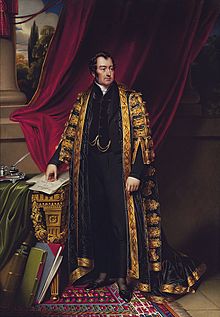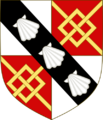John Spencer, 3rd Earl Spencer facts for kids
Quick facts for kids
The Earl Spencer
|
|
|---|---|

Lord Spencer as Chancellor of the Exchequer by Henry Pierce Bone.
|
|
| Chancellor of the Exchequer | |
| In office 22 November 1830 – 14 November 1834 |
|
| Prime Minister | The Earl Grey The Viscount Melbourne |
| Preceded by | Henry Goulburn |
| Succeeded by | Sir Robert Peel |
| Leader of the House of Commons | |
| In office 22 November 1830 – 14 November 1834 |
|
| Prime Minister | The Earl Grey The Viscount Melbourne |
| Preceded by | Sir Robert Peel |
| Succeeded by | Sir Robert Peel |
| Personal details | |
| Born | 30 May 1782 St James's, Middlesex, England |
| Died | 1 October 1845 (aged 63) Wiseton, Nottinghamshire, England |
| Political party | Whig |
| Spouse | Esther Acklom (m. 1814–1818; her death) |
| Parents | George Spencer, 2nd Earl Spencer Lady Lavinia Bingham |
| Alma mater | Trinity College, Cambridge |
John Charles Spencer, 3rd Earl Spencer (born May 30, 1782 – died October 1, 1845), was a very important British politician. He was known as Viscount Althorp for most of his life until 1834. He served as the Chancellor of the Exchequer, which is like the country's chief financial minister, from 1830 to 1834. He also led the main political party in the House of Commons. People called him "Honest Jack" because he was so trustworthy. He played a big part in ending slavery in the British Empire.
Contents
Early Life and Family Background
John Charles Spencer was born in London on May 30, 1782. His father, George Spencer, 2nd Earl Spencer, was also a well-known politician. He had served in several government roles, including leading the Admiralty, which was in charge of the navy.
Young John Charles went to Harrow School and then to Trinity College, Cambridge. At Cambridge, he studied math but also enjoyed hunting and racing. In 1803, he became a deputy lieutenant for Northamptonshire. This role helps support the county's government.
Starting a Political Career
In 1804, John Charles Spencer became a member of Parliament for the first time. He represented the area of Okehampton. He later represented St Albans and then Northamptonshire. He was always a supporter of Liberalism, which meant he believed in more freedom and rights for people.
From 1813 to 1818, he was not often in Parliament. This was partly because he felt it was hard to make changes against the ruling Tory party. But it was also because he was very sad after his wife passed away.
Leading the House of Commons
When he returned to politics in 1819, he worked to improve the legal system. He helped make it easier to recover small debts and create a better bankruptcy court. These changes were completed before 1825.
In 1830, the Whigs chose Lord Althorp to be their leader in the House of Commons. He proved to be a very good leader. In Lord Grey's government, he was both the Leader of the House of Commons and the Chancellor of the Exchequer.
He was key to the government's success. Along with Lord John Russell, he helped pass the Reform Bill of 1832. This important law changed how people voted, giving more people the right to vote. He gave many speeches and is seen as the main person behind its success.
Under his leadership, the House of Commons also voted to abolish slavery across the British Empire in 1833. This was a huge achievement.
Life in the House of Lords
In 1834, his father passed away, and John Charles Spencer became the 3rd Earl Spencer. This meant he moved from the House of Commons to the House of Lords. After this, he left his government jobs.
He was very happy to return to country life. From then on, he focused on farming, not politics. He was a famous cattle breeder and became the first president of the Royal Agricultural Society of England in 1838. This society helps improve farming methods. He also paid his respects to Queen Victoria at her Coronation that same year.
Even though his political friends often asked for his help, he rarely left his peaceful country life. He passed away on October 1, 1845. His brother, Frederick, became the next Earl Spencer.
Reputation and Lasting Impact
John Charles Spencer was known for his honesty and integrity. People called him "Honest Jack Althorp." He is sometimes called "the most decent man who ever held high Government office." Even though he wasn't the best public speaker, his honesty was very valuable to the government.
There is a street named after him in Melbourne, Australia, called Spencer Street.
Marriage and Personal Life
On April 13, 1814, John Charles Spencer married Esther Acklom. She was born in September 1788. Esther passed away on June 11, 1818, at the age of 29. She was buried in Brington, Northamptonshire.
John was very sad after his wife's death. He was devoted to her memory for the rest of his life. He decided never to marry again. It is also said that he gave up hunting, which was his favorite hobby, to show how much he missed her.
Images for kids
-
Portrait of Spencer's father and grandfather, by George Knapton, around 1744.
 | Kyle Baker |
 | Joseph Yoakum |
 | Laura Wheeler Waring |
 | Henry Ossawa Tanner |




